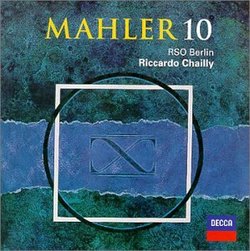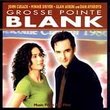| All Artists: Gustav Mahler, Riccardo Chailly, Rso Berlin Title: Mahler: Symphony no 10 / Chailly, RSO Berlin Members Wishing: 0 Total Copies: 0 Label: Decca Import Original Release Date: 1/1/1986 Re-Release Date: 6/13/2000 Album Type: Import Genres: Jazz, Classical Style: Symphonies Number of Discs: 1 SwapaCD Credits: 1 UPC: 028946695524 |
Search - Gustav Mahler, Riccardo Chailly, Rso Berlin :: Mahler: Symphony no 10 / Chailly, RSO Berlin
 | Gustav Mahler, Riccardo Chailly, Rso Berlin Mahler: Symphony no 10 / Chailly, RSO Berlin Genres: Jazz, Classical
As we all know, Gustav Mahler didn't actually compose a 10th symphony, or if he did, it was "Das Lied von der Erde," which he didn't call his 10th symphony because he was superstitious enough to believe that since Beethove... more » |
Larger Image |
CD DetailsSynopsis
Amazon.com As we all know, Gustav Mahler didn't actually compose a 10th symphony, or if he did, it was "Das Lied von der Erde," which he didn't call his 10th symphony because he was superstitious enough to believe that since Beethoven died before he could write a 10th, so might Mahler. He turned out to be right. Of a "10th" symphony, he wrote only the first movement more or less completely; the second is half done; the third is mostly unorchestrated; and the last two are well structured but remain almost entirely unorchestrated. In 1959, musicologist Deryck Cooke put together what he called "a performing version of the draft for the 10th Symphony," and it has been played (and recorded) occasionally in that form and is deemed quite a success--a sort of "next best thing." Much of it is remarkable, top-drawer Mahler, with all the potency, sadness (he was grieving over his wife's infidelity while he was composing the last three movements), and even playfulness (the second movement) he was capable of. Riccardo Chailly leads a beautiful reading in this re-release of a 1988 recording, and it is recommended. For another take, with an alteration or two, an early Simon Rattle recording is worth hearing. But Mahlerites will need a 10th, even if it was cursed. --Robert Levine Similarly Requested CDs
|
CD ReviewsTowering, visionary, transcendent. Daniel R. Greenfield | Milwaukee, Wisconsin, United States | 05/31/2001 (5 out of 5 stars) "Sir Simon Rattle's recording of Mahler 10 has received many positive reviews, and rightly so. However, this interpretation by Chailly sounds slightly better to my ears than Rattle's. It seems to me to be a little more expressive, with a greater dynamic range. But in fact both are great performances; nit-picking and splitting hairs has never appealed to me. As for the work itself, its finale has always haunted me, with its muffled drumbeats, its cathartic dissonant chord, and its gently haunting lyric that seems to express so perfectly Mahler's intense love of life and his longing for the infinite. This symphony (as it now stands, thanks to Cooke's noble efforts) has an apochryphal and apocalyptic quality that surrounds it in mystery and depth. It is a monumental work, towering, visionary, transcendent, without a trace of bitterness or self-pity." A Cohesive, Heartfelt Performance Grady Harp | Los Angeles, CA United States | 11/19/2004 (5 out of 5 stars) "Mahler's fragments of what was to be his Tenth Symphony contain some of the composer's most wrenchingly beautiful writing - and some sketches that obviously the composer would have re-thought had he survived to complete this gargantuan work! Yet thanks to musicologists (such as Deryck Cooke in this version) Mahler's intact Adagio first movement, his basically completed second movement, and the notes for the remainder of the work have been studied and orchestrated and allow us to experience the closing of life of one of the major symphonists in history. Of all the numerous versions of this reconstructed work none comes out as the definitive one: just when you think Simon Rattle's live recording with the Berlin Philharmonic is the pinnacle, along comes a live performance in a concert hall (young Daniel Harding guest conducting the LA Philharmonic in the wondrous acoustic of Disney Hall) and all bets are off. This recording of Ricardo Chailly with the Radio Symphony Orchestra of Berlin has warmth and power and a sweeping vision, despite the occasional lapses in the Cooke realization of Mahler's fragments, that certainly puts it among the higher-ranking versions. For the true Mahlerite it is probably important to have multiple recordings of the various performing versions as conducted by a variety of conductors to find out exactly what Mahler was saying and crying and sighing as his life ended. And this performance by Chailly should definitely be among them. Grady Harp, November 2004" A polished, energized reading in very good sound Santa Fe Listener | Santa Fe, NM USA | 11/24/2005 (4 out of 5 stars) "If this CD had to stand only on the opening Adagio of the Tenth Sym., the one movement Mahler finished in orhcestral scoring, Chailly would rate barely three stars. This inspired tragic fragment has been performed with much greater intensity by Bernstein, Abbado, and others, compared to Chailly's fairly brisk and glib traversal. He barely pauses to make expressive points.
What makes the rest of the recording notable is that major conductors have been reluctant to touch Deryck Cooke's performing version of Mahler's often sketchy drafts. (I've heard five other reconstructions as well, and all sound inferior to Cooke's, which is hte least intrusive with new ideas.) Only the premiere recording by Ormandy (one of his best performanes, and now newly remastered on Sony) and two by Simon Rattle from Bournemouth and Berlin rival Chailly in execution, and he has the definite edge in sound. Decca's 1988 sonics are detailed and full, overall better than what EMI gave Rattle from Berlin in 1999. Chailly had trained the Berlin Radio Symphony to a high polish by this time, and it is thrilling to hear them attack much of this music. Chailly conducts with energy and incisiveness in the last four movements. Rattle went one step further and tried to bring these sketches fully into Mahler's emotional world. We will never know if the Tenth would have been truly great--the surviving music is not wholly ocnvincing--but he had a long way to go before it was finished. Every Mahlerian should be grateful for this full-bodied and committed performance, even if it falls short of greatness. Four stars is an average between the poor Adagio and the rest of the reading, which rates five stars." |

 Track Listings (5) - Disc #1
Track Listings (5) - Disc #1








